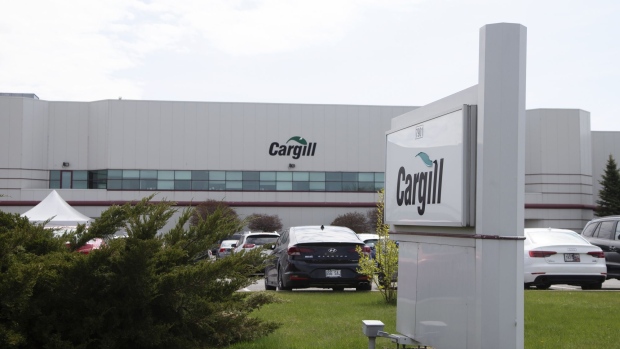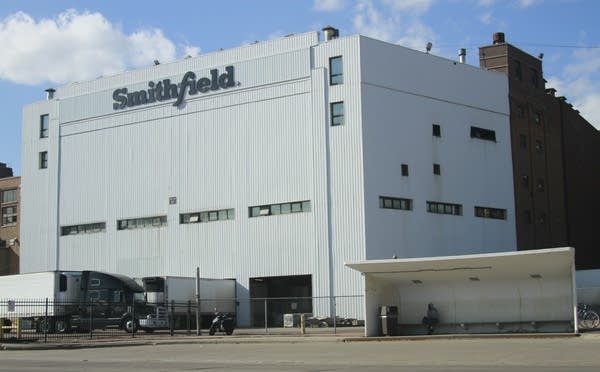High Priority Workforce
"I don't expect to see the same issues [that interfered with production and product shipping in the first wave of the pandemic].""We know a lot more than we ever did and I think our food supply chain is resilient to the point we will be OK.""Could we have issues where we may have to slow down in some spots as an industry? Potentially. For us, if we get to a point where we can't run a part of our facility or a facility safely or with the same food safety controls in place, we will shut it down."Jon Nash, head of protein, Cargill, North America
 |
| Signage is displayed outside the Cargill Inc. meat plant in Chambly, Quebec, Canada, on Monday, May 11, 2020. The case-ready facility for beef, pork, chicken and sausage has shut down as the company is “concerned about the number of cases in the community and among our employees,” according to a company statement in May. Photographer: Christinne Muschi/Bloomberg , Bloomberg |
"We're still running and we're still running at our capacity, but there have been more instances of absentees now than we had all summer or back in the spring.""It's becoming more of a challenge for us right now than it has been since this pandemic started.""We're providing flu shots for everybody and we are preparing hopefully to give COVID vaccinations when that becomes available, we think in March or April."Joe Sanderson, chief executive, JBS chicken production
With the latest resurgence of the coronavirus, North American meat packers are once again bracing for the onslaught, hoping to be able to avoid the shutdowns that occurred in spring and summer that left empty shelves at supermarkets and panicking consumers. One of Cargill Inc.'s beef plants in Canada has temporarily been idled again, following some positive tests in employees.
Thousands of vulnerable American workers were sent home on paid leave by the world's top meat producer, JBS. And Sanderson Farms Inc. is facing an issue of higher absenteeism at its plants than had occurred in the earlier months of the pandemic. The kind of disruption that shut several plants in the spring, curbing meat supplies just as consumers were planning to stock up against shortages; every meat producer's nightmare scenario.
It is now a top goal to prevent a disruption of that kind by producers of beef and chicken and everything in between. According to the executives of such companies, they are in a better place this time around in preparing to face another surge of cases since they spent millions on reconfiguring factories, on implementing social distancing and making available and distributing to workers needed protective equipment for infection safety protocols.
 |
| Cargill added several safety measures to prevent the spread of COVID-19, including these barriers between work stations at its High River plant. (Cargill |
Keeping plants running now comes at a high cost, given extra hours being worked to maintain schedules taking a physical toll on workers. Due to "an abundance of caution as our local workforce deals with the community-wide impacts of COVID-19", announced Cargill, the world's largest agricultural commodities trader, its beef processing plant in Ontario temporarily shut down. "This is not just a Cargill spread, but community-wide spread in Guelph" (90 km west of Toronto), explained April Nelson, company spokeswoman.
Over 5,000 workers were sent home by JBS in the U.S. since the acceleration of coronavirus cases in October, as infections rise among workers with an increase in cases in Texas, Mississippi, Georgia, the Carolinas and Louisiana. The challenges faced by meat packers in preventing the virus from entering their facilities and spreading among their workforces relate to the increase in cases across rural North America. Over 50,000 meatpacking workers in the U.S. have tested positive for the virus with over 200 having died.
Millions have been spent by meat packers installing Plexiglas dividers, expanding locker and cafeteria areas, providing masks and face shields. Innovations are being brought out; Foster Farms in California testing workers twice a week, and removing at-risk employees from its factories. In adapting its U.S. facilities in the 2020 fiscal year, Tyson spent $540 million with the addition of temperature scanners, workstation dividers and social distance monitors. Thousands of employees are being tested weekly including those not presenting with symptoms, according to a Tyson spokesman.
Workers in meat plants are putting in more extra hours and Saturdays. JBS staggered start times and breaks to create more social distancing; they installed UV germicidal air sanitation and plasma bipolar ionization technologies to neutralize possible airborne viruses as well as instituting temperature checks. But there are fewer people available on the lines and processes that took 16 hours now take 20, says Mark Lauritsen, director of food processing, packing and manufacturing at the United Food and Commercial Workers union, representing 1.3 million U.S. and Canadian workers.
There will be changes at the supermarket, with consumers noticing larger packages of ground beef, as an example. More in-bone products are being sent out by Cargill, and JBS too is simplifying its product line; more labour-intensive processing work like removing bones has been delayed, with workers focusing on essential tasks. The industry is lobbying for its workers to be deemed top priority for vaccines following health-care workers and people in long-term care facilities.
 |
The Smithfield pork processing plant in Sioux Falls, S.D. Stephen Groves | AP Photo |
Labels: Global Pandemic, Meat Processing Plants, Plant Closures, Worker Infection

0 Comments:
Post a Comment
<< Home